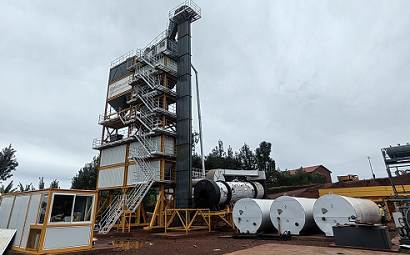How to choose the right asphalt mixing plant model according to demand?
I. The basis for the classification of asphalt mixing plant models
The models of imported asphalt mixing plants are mainly divided according to the following three aspects:
1. Production capacity: According to the size of production capacity, asphalt mixing plants can be divided into small (30-60 tons/hour), medium (60-300 tons/hour) and large (300 tons/hour or more).
2. Functional characteristics: Different models of asphalt mixing plants have different functional configurations, such as asphalt batching system, interference screening system, thermal regeneration system and asphalt storage system, etc., to meet the needs of different road construction projects.
3. Additional equipment: According to customer requirements, imported asphalt mixing plants can also be equipped with additional equipment such as environmental protection equipment, intelligent control systems, oil storage tanks, etc., which will also affect the classification of models.

II. The difference and application scope of different models of asphalt mixing plants
1. Small asphalt mixing plant: suitable for smaller-scale road construction projects, such as community or village roads. Although the production efficiency is low, it occupies a small area and is affordable.
2. Medium-sized asphalt mixing plant: suitable for medium-sized road construction, such as county and township roads. Its production efficiency is high, it has certain requirements for the quality of raw materials, and the price is moderate.
3. Large asphalt mixing plant: suitable for large-scale construction projects such as highways and airports. The production efficiency is extremely high, and the requirements for asphalt materials are also higher, but it occupies a large area and has a high price.
In summary, the selection of a suitable imported asphalt mixing plant model requires comprehensive consideration of factors such as production capacity, functional characteristics and additional equipment, and selection and purchase according to the needs of the actual road construction project.
 Albanian
Albanian  Russian
Russian  Arabic
Arabic  Amharic
Amharic  Azerbaijani
Azerbaijani  Irish
Irish  Estonian
Estonian  Odia (Oriya)
Odia (Oriya)  Basque
Basque  Belarusian
Belarusian  Bulgarian
Bulgarian  Icelandic
Icelandic  Polish
Polish  Bosnian
Bosnian  Persian
Persian  Afrikaans
Afrikaans  Tatar
Tatar  Danish
Danish  German
German  French
French  Filipino
Filipino  Finnish
Finnish  Frisian
Frisian  Khmer
Khmer  Georgian
Georgian  Gujarati
Gujarati  Kazakh
Kazakh  Haitian Creole
Haitian Creole  Korean
Korean  Hausa
Hausa  Dutch
Dutch  Kyrgyz
Kyrgyz  Galician
Galician  Catalan
Catalan  Czech
Czech  Kannada
Kannada  Corsican
Corsican  Croatian
Croatian  Kurdish (Kurmanji)
Kurdish (Kurmanji)  Latin
Latin  Latvian
Latvian  Lao
Lao  Lithuanian
Lithuanian  Luxembourgish
Luxembourgish  Kinyarwanda
Kinyarwanda  Romanian
Romanian  Malagasy
Malagasy  Maltese
Maltese  Marathi
Marathi  Malayalam
Malayalam  Malay
Malay  Macedonian
Macedonian  Maori
Maori  Mongolian
Mongolian  Bengali
Bengali  Myanmar (Burmese)
Myanmar (Burmese)  Hmong
Hmong  Xhosa
Xhosa  Zulu
Zulu  Nepali
Nepali  Norwegian
Norwegian  Punjabi
Punjabi  Portuguese
Portuguese  Pashto
Pashto  Chichewa
Chichewa  Japanese
Japanese  Swedish
Swedish  Samoan
Samoan  Serbian
Serbian  Sesotho
Sesotho  Sinhala
Sinhala  Esperanto
Esperanto  Slovak
Slovak  Slovenian
Slovenian  Swahili
Swahili  Scots Gaelic
Scots Gaelic  Cebuano
Cebuano  Somali
Somali  Tajik
Tajik  Telugu
Telugu  Tamil
Tamil  Thai
Thai  Turkish
Turkish  Turkmen
Turkmen  Welsh
Welsh  Uyghur
Uyghur  Urdu
Urdu  Ukrainian
Ukrainian  Uzbek
Uzbek  Spanish
Spanish  Hebrew
Hebrew  Greek
Greek  Hawaiian
Hawaiian  Sindhi
Sindhi  Hungarian
Hungarian  Shona
Shona  Armenian
Armenian  Igbo
Igbo  Italian
Italian  Yiddish
Yiddish  Hindi
Hindi  Sundanese
Sundanese  Indonesian
Indonesian  Javanese
Javanese  Yoruba
Yoruba  Vietnamese
Vietnamese  Hebrew
Hebrew  Chinese (Simplified)
Chinese (Simplified)






